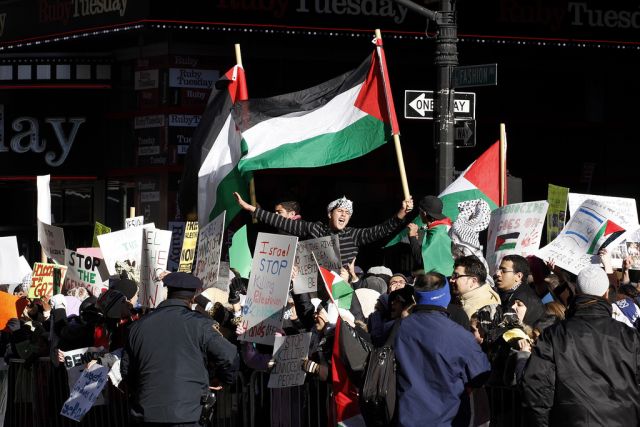
Palestinian activists in the occupied West Bank have called for the boycott of the popular Rami Levy Israeli supermarket chain. The chain has several stores inside Israel’s illegal settlements.
Activists say they will call on fellow Palestinians to “avoid supporting the occupation and settlements’ economy by boycotting Israeli goods and settlement stores”.
A vigil was held on September 23 outside the Rami Levy store inside the Sha’ar Binyamin settlement south of Bethlehem.
Activists with the Popular Struggle Coordination Committee (PSCC) said on September 22 that the chain is “popular among some Palestinian shoppers, attracting its clientele through cheap pricing”.
The PSCC said “demonstrators will also remind Palestinians that Rami Levy, the owner of the supermarket chain, is a member of the Jerusalem municipality, and as such is directly complicit in Jerusalem house demolitions and city-sponsored settler takeovers of Palestinian homes”.
Mohammed Khatib, a PSCC organiser from the West Bank village of Bilin, said: “The Palestinian market is one of the main export markets for Israel. It is absurd for us to support our own repression in this way, especially when viable alternatives exist.
“Every shekel to Rami Levy is a shekel to the continuation of the occupation. This must stop.”
Meanwhile, a growing cultural boycott movement against the settlement industry by Jewish and Israeli artists and actors is gaining international support. World-renowned architect Frank Gehry and composer Daniel Barenboim have signed the boycott statement.
The statement was written by a group of Israeli actors who, in August, publicly refused to perform in a new centre for performing arts inside the Ariel settlement.
US group Jewish Voice for Peace (JVP), which drafted the statement, said on September 20 it had already been signed by more than “200 theater and film professionals representing some of the most respected and renowned artists in theater and film — including Oscar, Tony, Grammy and Pulitzer prize-winner Stephen Sondheim, Julianne Moore, film director Mira Nair, Sex and the City’s Cynthia Nixon, Pulitzer Prize winning playwright Tony Kushner, 21-time Tony winner Harold Prince … among many others”.
JVP reported that this year, Gehry stepped down as the architect for the Museum of Tolerance in West Jerusalem, which is being funded by the Los Angeles-based Simon Wiesenthal Center. The Museum is being built atop the ancient Muslim cemetery of Mamilla, where graves are being regularly destroyed as museum construction pushes forward.
JVP’s Deputy Director Cecilie Surasky said: “It is particularly critical for architects to speak out against the ongoing construction of Jewish-only communities on Palestinian land. Architects and planners are the key implementers of the Israeli policy of taking and brutally occupying Palestinian land in violation of international law.
“We hope Israeli architects will be inspired to launch their own campaign to refuse to work in the settlements.”
In California, the Israeli Divestment Campaign launched a ballot initiative on September 8 that would require public and state agencies, including teachers’ investment funds, to divest from Israeli companies that violate Palestinians’ human rights.
Organisers say the initiative “prohibits state retirement funds from investing in companies engaged in certain business activities in Israel” and that “public pension funds in Norway and Sweden have already divested from one of the companies identified by the initiative organizers”.
The US Campaign for the Academic and Cultural Boycott of Israel (USACBI) said in a September 20 statement that more than 500 academics have signed on as endorsers to its initiative. “When originally founded in 2009, only a handful of academics called for the academic and cultural boycott of Israel”, USACBI said.
Referring to Gerald Steinberg, professor of political science at Israel’s Bar-Ilan University and co-founder of the anti-boycott International Advisory Board for Academic Freedom, USACBI said: “The call was dismissed as having little to no significance … For Steinberg and others, the power of an academic and cultural boycott would be achieved with a critical mass of 500 endorsers.”
After the US academic boycott initiative began with 15 signatories of academic and cultural workers, Steinberg told the New York-based Jewish Daily in February 2009 that “the danger is not these 15; the danger is if the [boycott] becomes 500”.
USACBI said: “This is a major victory for the growing academic and cultural boycott of Israel. There is a growing shift in the tide of public opinion in the US which has only swelled in the wake of Israel’s massacre of international activists and relief workers on humanitarian aid flotillas off the coast of Gaza in international waters on 31 May.”
In Britain, trade unions have “thrown their weight” behind a broad-based divestment and boycott campaign from companies that profit from the Israeli occupation.
Organisers said: “Trade unions voted unanimously [on September 14] at the Trade Union’s Congress (TUC) annual conference for a motion put forward by the Transport Salaried Staffs’ Association, seconded by the General, Municipal, Boilermakers and Allied Trade Union, and supported by [trade union] UNISON, the Public and Commercial Services Union, and the Fire Brigades’ Union.”
Organisers said: “The motion called for the General Council to work closely with the Palestine Solidarity Campaign to actively encourage affiliates, employers and pension funds to disinvest from, and boycott the goods of, companies who profit from illegal settlements, the Occupation and construction of the Apartheid Wall.”
[Abridged from www.electronicintifada.net.]